Your little one is becoming more independent everyday!
This means your baby may start holding their bottle during feeding times and moving about more on their own.
The skills that are needed to feed themselves, regulate sleep, and become independent in daily routines are known as adaptive or self help skills.
In this post I will give you information about what self help skills look like and how to encourage self help skills in babies from 3 to 6 months.
All children develop differently so know that if your baby is not doing the exact same things as your best friend’s, that is ok.
However, if you are concerned about your little one’s development always seek out the Early Intervention program in your area for a free screening or evaluation.
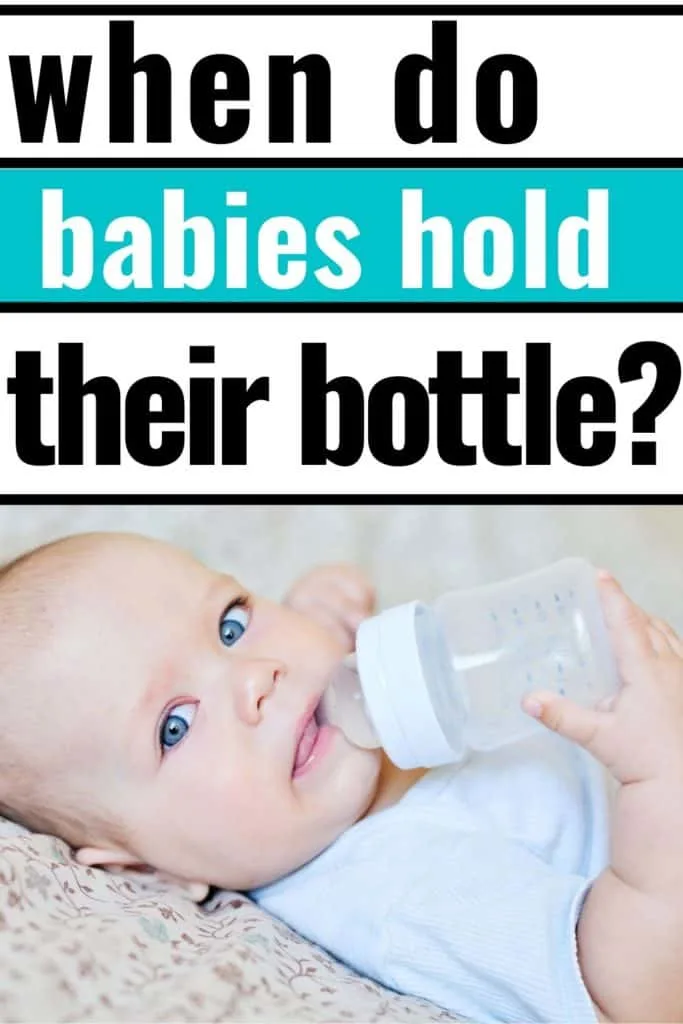
(This post contains affiliate links. To read our full disclosure policy click here.)
6-9 Months Adaptive Milestones:
Exploring Toys with Mouth
Is your baby starting to put EVERYTHING in their mouths? This is a good sign! Your baby takes in a lot of information by exploring with their mouth.
Give them safe toys (like these) to help them explore with this sense.
This is also a great time to make sure you have everything baby proofed.
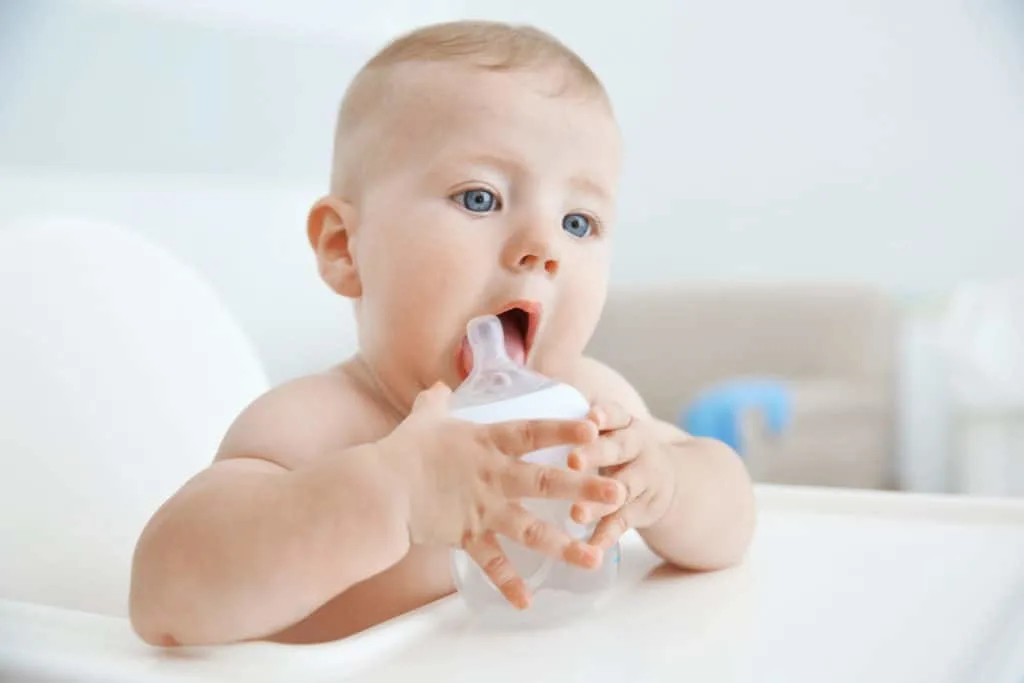
Baby Holding Bottle
If your baby is taking a bottle they should be starting to hold it independently between 6-9 months.
You can help them learn this skill by gently helping then hold the bottle, but then give them less support as they become stronger.
You will also want to check out the activities below as many of the skills needed to hold a bottle can be strengthened through play.
At first they may only be able to hold it up for a few seconds at a time, but as they become more independent they should be able to hold it up the entire feeding.
Baby Food Time
Most babies are ready to start having solid foods introduced around 6 months.
This is a GREAT question to ask your pediatrician when you go into your 6 month check up.
Every baby is different and some may be ready and others may not.
Some of the signs that they may be ready include:
- Sitting Independently
- Interested in food or mealtimes
- Increased Hunger
Baby Sleep 6-9 Months
Your baby should be sleeping about 10 to 12 hours a night and may still have some nighttime wake ups.
Naps can range from 2-3 times each day for 1-4 hours in length.
If you are struggling with getting your baby to sleep and need more information click here.
6-9 Month Baby Activities that Encourage Adaptive Skills
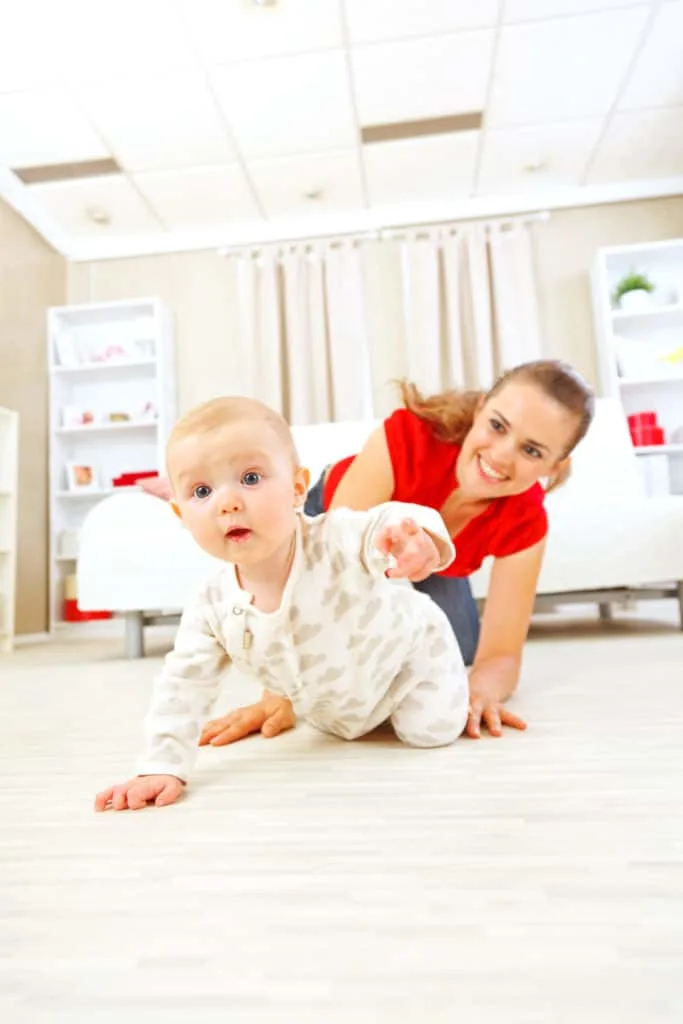
Exploring Environment
As your baby is becoming more independent and can move about their environment you need to make sure that it is baby proofed (read more about baby proofing here.)
Set out toys and objects that they are interested in around the room and see if they can get to them with little or no help.
Your baby will build the motor skills needed to navigate on their own with this type of practice.
Gaining Independence
A big part of self help development is your baby becoming independent in daily routines.
This could mean picking up their cheerios with their fingers or lifting their arms to get dressed.
You can help them gain these skills by just helping less.
Instead of spooning baby food into their mouth..let them try and do it!
It will take lots of practice and some help is ok.
Watch their cues and make sure to back off a bit when they are showing signs that they would like to do something independently.
Take time to model skills for them as well.
Show them how to pick up a spoon and bring it to your mouth.
Siblings are perfect role models as well so include them in teaching your baby new skills.
Show them how to point and ask for objects rather then always predicting what they want and giving it to them.
This is just one way to encourage those early communication skills.
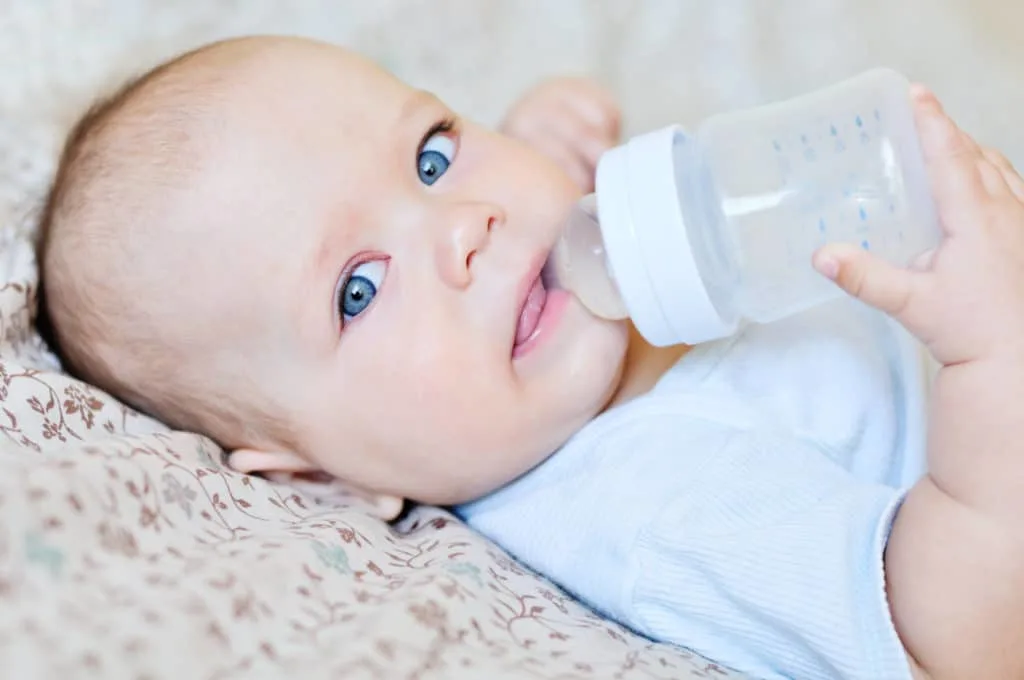
How to Get Baby To Hold Bottle
One thing to keep in mind is there is a big different between bottle propping and your baby holding their own bottle to feed.
Bottle propping is when you lay the baby in a position and prop the bottle so that they can “feed themselves”.
DO NOT DO THAT.
It is dangerous because it is not a natural position for babies and can cause choking.
Letting your baby hold the bottle when they are feeding is safe.
They need to have arm strength and enough fine motor control to lift the bottle to their mouths.
You can help them learn this skills by gently placing their hands on the bottle during feeding times.
You let go of the bottle and let them attempt to hold it.
At first this may only be a few seconds but as they get stronger they will be able to hold the bottle during a full feeding session.
Establish Routines
In order to promote good sleep habits, establish a bedtime routine. Reading (simple books like these work great) and singing and perfect activities to include into your routine.
Make sure to give your baby time to calm down and fall asleep. Always follow safe sleep practices (if you need more information on safe sleep guidelines click here.)
Still struggling with sleep? For more information on creating good sleep habits click here!
Want to learn more about your 6-9 month old baby?
Click on the links below to learn all about 6-9 month old child development
Communication Development 6-9 Months
Physical Development 6-9 Months
Intellectual Development 6-9 Months
Frequently Asked Questions
Yes, but only if your baby has the coordination and strength to do so. Never prop your baby to feed themselves as this is dangerous and can lead to choking.
Allow them lots of playtime on the floor where they can move freely. Offer them simple toys to grasp and play with so that they can start building strength in their hands and arms. Gently place their hands on the bottle during feeding times and see how they respond.
Sleep is a developmental milestone and your baby may or may not be ready to sleep through the night by six months. Many babies will still wake during the night at 6 months old.
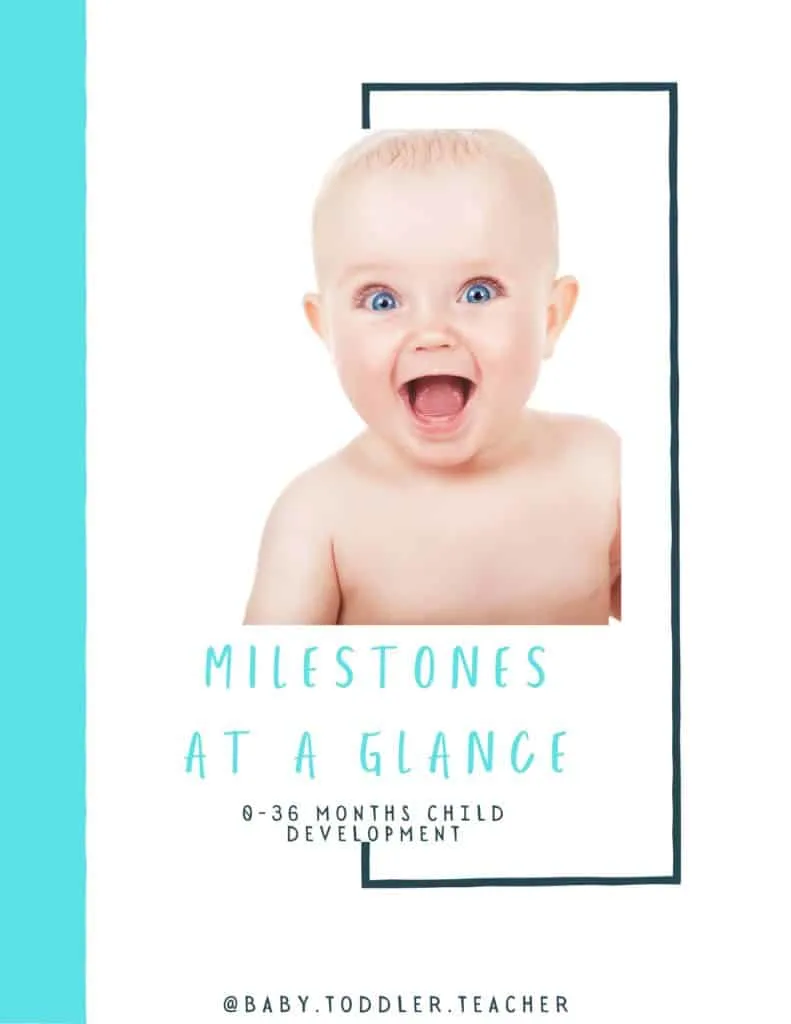
Grab your FREE Milestone Guide HERE.
Related Posts You Will Enjoy
Baby Standing Milestones: Everything You Need to Know
Which Baby Crawling Mat is Best for Your Baby?
The Best Fine Motor Toys for Babies
How to Stay Sane with a Clingy Baby
Fun Baby Outdoor Activities to Try Today
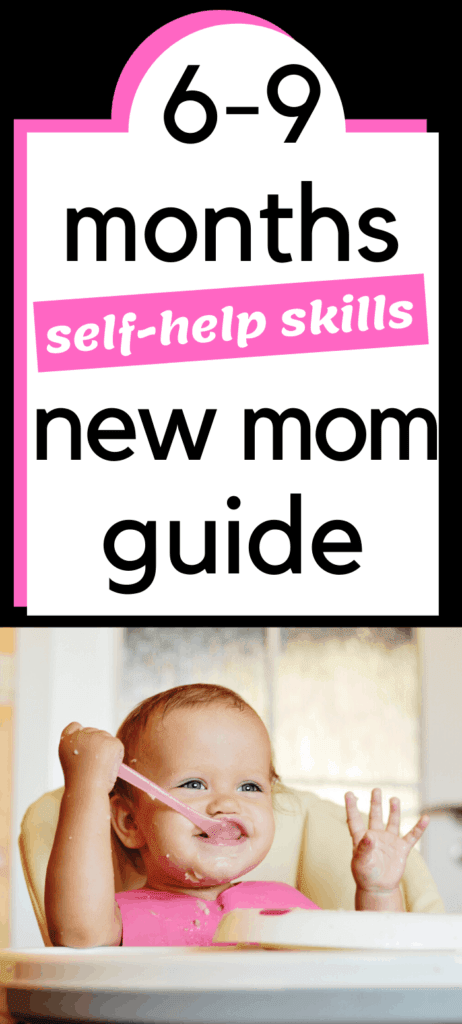
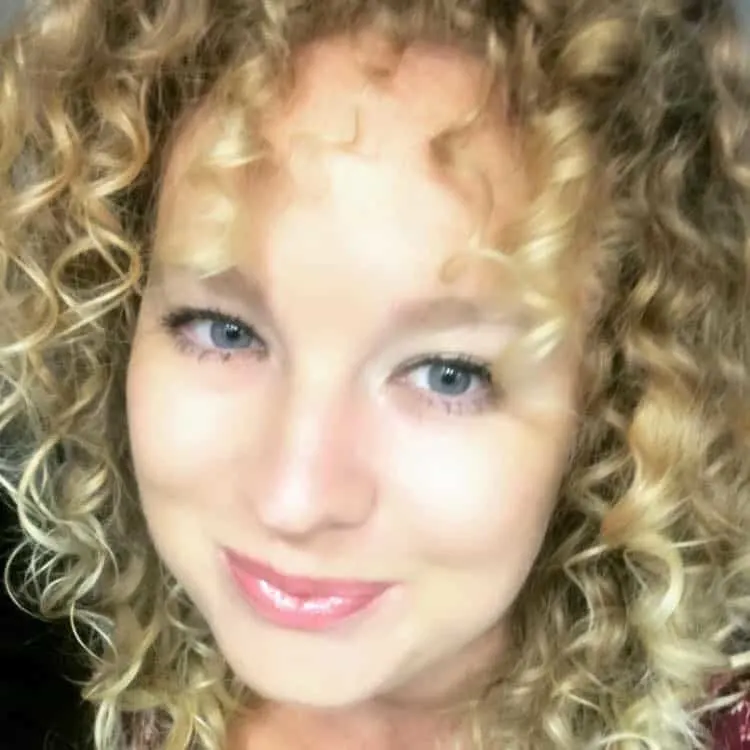
Kayla O’Neill has a master’s degree in education as well as a bachelor’s degree in special education with an emphasis in early childhood education. She has been working as a developmental therapist with babies and toddlers in early intervention since 2012. She is also a mom with two young children.